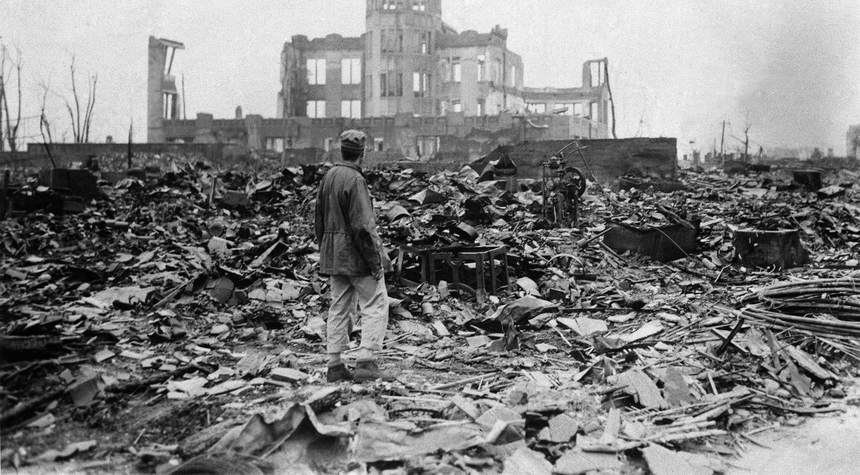We're All Condemned to Forever Fight About the Decision to Drop the Atomic Bomb on Japan

Article by Rick Moran in PJMedia
We're All Condemned to Forever Fight About the Decision to Drop the Atomic Bomb on Japan
The date of Aug. 6, 1945, is solemnly remembered in Japan and much of the world as marking the first use of an atomic weapon. Whether that act by the United States was necessary has been the subject of scholarly debate and barroom disputes for 77 years.
What isn’t in dispute is that 77 years ago, Col. Paul Tibbets, commander of the 509th Composite Group and pilot of a plane he named after his mother — the Enola Gay — flew over Hiroshima’s Aioi Bridge and began to bank his aircraft.
Just as Tibbets started his turn, the B-29 lurched violently as 10,000 pounds of American technical, industrial, and scientific ingenuity fell out of the bomb bay almost exactly on schedule (navigator Capt. Theodore Van Kirk’s calculations of time over target were 15 seconds off). Little Boy, they called it, in an ironic juxtaposition to its massive bulk. It was a gun-type nuclear bomb — a crude, primitive, inefficient device by our standards. And for all the effort, money, time, and brainpower that went into designing it, Little Boy was simplicity incarnate.
A hollow bullet of highly enriched uranium 235 was placed at one end of a long tube with a larger mass of enriched uranium at the other end. The larger cylinder of nuclear material was barely “subcritical” — that is, needing just a bit more in order to start a chain reaction and cause an explosion.
When Little Boy hit 1,900 feet above Hiroshima (it had drifted about 800 feet from the target), the uranium bullet fired down the barrel and impacted the cylinder perfectly. For two-millionths of a second, the mass that used to be Little Boy became as hot as the sun. This heat so thoroughly eliminated humans directly below the blast, all that could be seen afterward were shadow-like outlines of people on the concrete.
There have been the usual calls for nuclear disarmament — as if the nuclear genie can ever be put back in the bottle. The fact is, Hiroshima was a horrible tragedy made necessary by Japanese militarism, Japanese aggression, and Japan’s appetite for empire.
That’s my opinion. Only the use of the bomb and using it on two Japanese cities just days apart assured the surrender of the fanatics in Tokyo — several of whom were so fanatical that they took their own lives rather than surrender.
To those who claim the Japanese were just about to surrender, you must show that the world would have been guaranteed the end of the military’s dominance in Japan’s government and the turning over of hundreds of war criminals who butchered and raped their way across Asia.
That guarantee was not even being discussed by Japan, which was still trying to get Josef Stalin to act as an intermediary on Aug. 6, 1945. The Japanese were unwilling to cede some of the territories they conquered during the war.
But for those who have moral objections to dropping the bomb, none of these points matter. Even an invasion by the U.S. in 1946 that might have killed half a million GIs and twice that number of Japanese would have been preferable to incinerating 150,000 Japanese in Hiroshima and Nagasaki.
Would that really have been less cruel?
The decision to drop the bomb will always be controversial because the answer to that question is yes, there were other ways we could have ended the war with Japan. Some would almost certainly have cost more lives than were lost at Hiroshima and Nagasaki. Army Air Force Commander of Strategic Forces in the Pacific Curtis LeMay believed that, given six months and freedom to target whatever he wished, he could have brought Japan to its knees by completely destroying its ability to feed itself. Victory assured — at the cost of several million starved Japanese.
The navy thought a blockade would do the trick. Starving the Japanese war machine of raw materials and the people of food they were importing from occupied China would have the Japanese government begging for peace in a matter of six months to a year. Again, visions of millions of deaths from starvation came with the plan.
The primary argument today for not using the bomb rests on some newly discovered cables that seem to show Japan ready to capitulate as early as July 1945. It was then clear to the Japanese that the Soviet Union would invade in a matter of weeks. Again, while provocative, the United States could not afford to let Japan up off the mat without guarantees that Japan would be unable to build up its military again. As it was, it took a provision in the new Japanese Constitution, written by General McArthur, that kept the Japanese military small and totally dependent on the U.S. for its defense.
Most sane people wish that the use of the atomic bomb had not been necessary. But no matter where you come down on the question, the undeniable truth is that dropping the bomb ended the war. And if there’s nothing moral about war to begin with — except its quick and decisive ending in victory — that might be the best argument for using it to this day.






Post a Comment